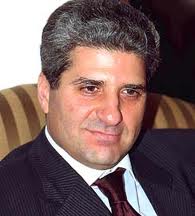هدية للنظام السوري
أحمد الأسعد/02 تشرين الثاني/17
ثمة تناقض فاقع بين رفض جزء من مكوّنات الحكومة التطبيع مع النظام السوري، وخطابهم العالي النبرة في مواجهة المحاولات التي يقوم بها فريق 8 آذار في هذا الإتجاه، وبين خطوة توقيع رئيسي الجمهوريّة والحكومة على مرسوم تعيين سفير جديد لدى النظام في سوريا.
ها نحن اليوم أمام تنازل جديد من فريق ما كان يعرف بـ14 آذار، ومكسب إضافي لفريق المحور الإيراني- السوري. ومشهد السفير اللبناني مقدّماً أوراق اعتماده إلى رئيس النظام السوري يشكّل تكريساً لبداية التطبيع الصريح والمباشر مع هذا النظام، مما يناقض كلياً الإعتراضات على محاولات حزب الله وحلفائه لتطبيقه مواربة.
صحيح أن انتزاع العلاقات الديبلوماسية مع سوريا كان مكسباً سيادياً تاريخياً للبنان ينبغي الحفاظ عليه، ولكنّ ترك المنصب شاغراً في الوقت الراهن ليس من شأنه أن يلغي هذا المكسب.
في حالات كثيرة، لا تعيّن الدول سفراء في مراحل معينة، وتكتفي بتمثيل أدنى، ويكون ذلك تعبيراً عن موقف سياسي. في حالتنا، الموقف السياسي الرسمي هو النأي بالنفس، وكان ينبغي ترك الأمور على حالها انطلاقاً من هذا الموقف.
كان شغور المنصب مخرجاً ملائماً، ولم يكن ثمة ضرر في إبقاء المنصب شاغراً كما بقيت مناصب كثيرة في السلك الديبلوماسي والإدارة العامة أعواماً طويلة.
أما تعيين سفير جديد في هذا الظرف بالذات، وفي ظل العزلة الدولية المفروضة على النظام السوري، فهو يوحي، شئنا أن أبينا، بموقف مغاير للنأي بالنفس، ويُفسَّر انحيازاً إلى هذا النظام، وتطبيعاً معه.
وحتى لو لم يكن كذلك، فالنظام السوري سيعمل على إبرازه كخطوة في هذا السياق، وسيحاول استغلاله قدر الإمكان لكسر عزلته.
باختصار، إنها هدية ثمينة قدمها العهد، بكل مكوناته بمن فيهم فريق ما كان يعرف بـ14 آذار، للنظام السوري…والآتي أعظم.
A Gift to the Syrian Regime
Ahmad El-Assaad
November 02, 2017
There is a blatant contrast between the fact that a part of the components of the Government refuses the normalization with the Syrian regime, and their high-toned rhetoric facing the attempts that the 8 March camp is undertaking in that regard, on the one hand, and the fact that the President and the Prime Minister just signed a decree to appoint a new ambassador in the Syrian regime, on the other hand.
Here we are today, in front of yet another concession offered by what used to be known as “14 March”, and an additional gain to the Iranian-Syrian axis. The sight of the Lebanese ambassador presenting his credentials to the President of the Syrian regime represents the consecration of the start of the clear and direct normalization process with this regime. This completely contradicts the objections to the attempts made by Hezbollah and its allies to apply it through equivocation.
It is true that withdrawing diplomatic ties with Syria was an historical, sovereign gain for Lebanon that we must preserve. But leaving this position vacant for the moment is in no way a negation of the said gain. In many cases, nations do not appoint ambassadors at certain periods of time, and settle for minimal representation – as a way to express a certain political position. In our case, the official political position was self-exclusion, and things should have been left alone based on that position. The vacant position was a good exit, and there was no harm in keeping it vacant, as many others were in the diplomatic sector and the public administration, for many years.
But appointing an ambassador in these specific circumstances, in the light of the international isolation imposed on the Syrian regime, suggests, whether we want it or not, a position different than self-exclusion, and is explained as a bias to this regime, and a normalization with it. Even if it wasn’t the case, the Syrian regime will work on showing it as such, and will try to use it to break its isolation as much as possible.
In short, it is a very valuable gift made by the mandate, in all of its components, to the Syrian regime… and greater things are to come.






















